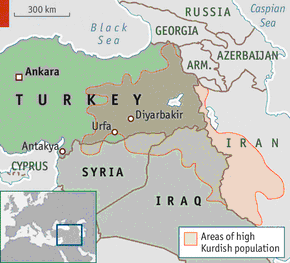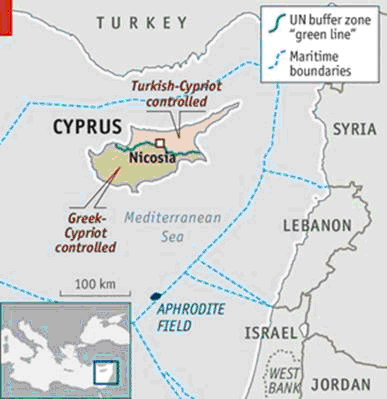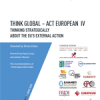Theme: Turkey’s EU accession process is back on track, with the opening this month of the first chapter, or policy area, in more than three years, but the Islamist-rooted government continues to send out mixed signals over the country’s direction.
Summary: Turkey is re-engaging with the EU in its sluggish accession process. The first chapter, or policy area, was opened on 5 November since the end of the Spanish EU presidency in June 2010. Fourteen of the 35 chapters have now been opened since October 2005, but only one has been temporarily closed. The rest of the chapters are either blocked because of French and Cypriot objections or frozen by Brussels because of Ankara’s failure to implement the 2005 Ankara Protocol and open its ports and airports to Greek-Cypriot traffic and hence extend its customs union with the EU (since 1996) and recognise the Republic of Cyprus, an EU country since 2004.
The Greek-Cypriot and Turkish-Cypriot leaders met on 25 November for the first time in 18 months in a bid to break the decades-long deadlock on reunification, which is not a condition for Turkey’s full EU membership.
In moves that were at odds with Turkey’s European vocation and its longstanding membership of NATO since 1952, the decision to buy a long-range defence system from a Chinese company shocked Washington and Brussels, as it is incompatible with NATO’s defences. Prime Minister Recep Tayyip Erdogan asked the Russian President Vladimir Putin on 22 November if Turkey could form part of the Shanghai Cooperation Organisation along with Russia, China, Kazakhstan, Kyrgyzstan, Tajikistan and Uzbekistan. In the Middle East, Turkey’s ambassador to Egypt was expelled from the country on 23 November after Ankara was accused of backing organisations bent on undermining the country. Erdogan supported the ousted and jailed Egyptian President Mohamed Morsi and denounced the coup. He called for Morsi to be freed.
As if to underline its increasing disillusionment with the EU, the ruling Justice and Development Party (AKP), in power since 2002, stopped being an observer in the centre-right European Peoples’ Party (EPP) and joined the euro-sceptic Alliance of European Conservative and Reformists (AECR). Carl Bildt, Sweden’s Foreign Minister and a supporter of Turkey’s EU membership, called the move ‘profoundly stupid’.
Analysis: The chapter on regional policy and coordination of structural instruments was due to be opened at the end of June, but was postponed because of Ankara’s brutal handling of demonstrations that rocked the country and particularly appalled Angela Merkel, Germany’s Chancellor. The protests began peacefully over the development of Gezi Park, a rare green space near Taksim Square in the heart of Istanbul, and spread to 72 of Turkey’s 82 provinces, leaving six dead and 8,000 injured. Initially about the park, the environmental protests turned into demonstrations against the government’s increasing authoritarianism and creeping Islamisation. Rather than call a halt to Turkey’s accession negotiations, EU countries decided to wait until the autumn and the release of the annual report on Turkey’s progress towards meeting EU norms before making any decision about opening the new chapter (on regional policy).
Germany’s preference for a ‘privileged relationship’ with Turkey, rejected by Ankara, as opposed to full membership, was reaffirmed earlier this month shortly after the chapter was opened. Merkel’s Christian Democrats and the centre-left Social Democrats (SPD), which are negotiating a coalition government, described Turkey’s EU membership talks in a joint foreign policy paper as ‘open-ended’. The wording was a little tougher than that in a 2005 coalition contract between the two parties which said that Germany had a ‘special interest’ in deepening ties with Turkey, but without backing or rejecting full membership.[1]
In the eight years since then, public support for Turkey’s membership (inside and outside the country) has declined and doubts about the AKP’s commitment to democracy have increased. Turkey’s image as a beacon for the co-existence of Islam and democracy was severely damaged by Ankara’s poor understanding in the summer of what constitutes democratic dissent and by the government’s vindictiveness, after the protests ended, towards those who directly or indirectly supported the demonstrations. More than 1,000 students, teachers, doctors and activists –even mosque imams– have been called in for questioning and dozens of journalists fired for reporting on the demonstrations. The Koç Holding, Turkey’s largest industrial conglomerate (around 10% of GDP), is under a tax investigation apparently for giving refuge in a luxury Istanbul hotel to demonstrators escaping clouds of tear gas.
The EU’s latest progress report makes it crystal clear that Turkey is still a very long way from meeting the norms and practices that prevail in member countries. A key reform collapsed earlier this month when the AKP pulled the plug on the parliamentary committee that for the last two years has been trying to draft a new constitution to replace the one drawn up in 1982 after the last military coup. It now seems that reforming the constitution will not be continued until after the 2015 elections. Agreement was reached on a new formulation of around 60 articles, but 112 remain unresolved. The AKP does not have sufficient seats in parliament to push through a new constitution on its own.
The four-party committee –the AKP, the centre-left Republican People’s Party (CHP, established by Mustafa Kemal Atatürk, the founder of the secular Republic of Turkey in 1923, and representing the old guard secular forces), the Nationalist Movement Party (MHP) and the pro-Kurdish Peace and Democracy Party (BDP)– have to agree the changes unanimously. The main areas where agreement could not be reached, as a result of each party’s entrenched positions, included a new and more powerful French-style presidential system (Erdogan hankers after the post which will be directly elected next year), the extent of rights for the Kurdish population (which numbers around 14 million, or 20% of the population) and issues such as secularism (one of the Republic’s founding and ‘immovable’ principles that the AKP has gradually eroded: a landmark law in October lifted a ban on public employees wearing the Islamic head scarf).
The Kurdish issue
The Kurdistan Workers’ Party (PKK), which for 30 years has fought for an ethnic Kurdish homeland in south-east Turkey (see Figure 1), has stuck to its ceasefire since last March amid the government’s reforms giving or promising Kurds more rights, but has yet to lay down its arms. An estimated 40,000 people have been killed in the conflict.
Erdogan has promised to lower the 10% national election threshold for parties to enter parliament (the EU norm is 5%). This would allow fairer political representation for the main Kurdish party (members run as independents and club together as MPs), which tends to win 6-7% of the vote, and he has announced plans to introduce education in the Kurdish language in private schools (there is already Kurdish language television), though not in state schools, a main demand of the community. The government has also failed to redraft the constitution in order to remove any hint of ethnic discrimination and change the very restrictive anti-terrorism law that still keeps thousands of non-violent Kurdish activists in preventive detention, some now for four years, as well as being used against journalists, 67 of whom were in prison at the last count.[2]
Figure 1. The Kurdish question

But none of these reforms have yet been implemented. The government fears, unreasonably according to some experts, a nationalist backlash as it heads into a two-year cycle of local, presidential and parliamentary elections. The nationalist CHP and MHP, the two main opposition parties, are largely against the reforms and any deal with the PKK, but they are weak, while the army, which fought a dirty war with Kurds in the 1980s, is no longer a threat to the AKP government as it has lost its political power and had its wings clipped, following the ‘Sledgehammer’ and ‘Ergenekon’ trials of coup plotters and the jailing of key military officers. A satisfactory and lasting solution to the Kurdish issue is a key element in Turkey becoming a fully-fledged democracy.
AKP moves to the euro-sceptics’ political grouping
The opening of a new chapter keeps Turkey on board with Europe and prevents the negotiations from coming to a complete halt, but the AKP’s decision to stop being an observer in the centre-right European Peoples’ Party (EPP) and switch to the euro-sceptic Alliance of European Conservative and Reformists (AECR) raised eyebrows among the country’s EU supporters. As well as being the largest group in the European Parliament, 18 of the 27 heads of state and government belong to the EPP family and 13 EU Commissioners come from EPP parties. Sweden’s Foreign Minister, Carl Bildt, a supporter of Turkey’s full EU membership, called the move ‘profoundly stupid’.
The change, however, was understandable as the AKP was not given a warm welcome by all members of the EPP since it was granted observer status in 2005, particularly from the Germans, French and Austrians. However, not all parties in the EPP are dismissive of Turkey’s EU bid: Silvio Berlusconi’s party, Spain’s Popular Party, Poland’s Civic Platform and Sweden’s Moderate Party defended Turkey’s EU accession and the AKP’s rightful place at the EPP table. By slamming the door in the face of Angela Merkel and her Turkophobic colleagues in the EPP, the AKP has also distanced itself from some of the committed supporters of Turkey. The AECR is dominated by the British Conservatives, the Czech Civic Forum and Poland’s Law and Justice Party, although the Conservatives and the Civic Forum are in favour of Turkey’s EU membership. Maybe this is all academic at this point because Turkey is so far away from EU membership, but the decision to switch political allegiance runs the risk of Turkey losing friends in high places, and it does not have that many.
No let up in Erdogan’s social conservatism
Erdogan continues to seek to govern people’s private lives. In the latest intrusion, he wants to outlaw co-ed dormitories at state universities and ban off-campus housing shared by male and female students. This follows his urging of women to have at least three children and attempts to make abortion and adultery illegal and limit alcohol consumption (controversial legislation to restrict the sale and advertising of alcohol was approved in May).
The Prime Minister also has in his sights the closure of the 3,600 pre-university crammers that prepare high school students for the national university exams. Entry into Turkey’s universities is very competitive and only a small proportion of students get in.
Around one-quarter of these crammers, known as dershaneler in Turkish, are operated by the Gülen Movement, a moderate Islamic community whose main focus is education in Turkey and in other countries, while it also has significant media interests. Its founder, Muhammed Fethullah Gülen, lives in Pennsylvania and supported Erdogan’s AKP in the first years of his government in its battles with the old guard –the military and its ultra-secularist allies– but has since fallen out with him, particularly because of his handling of the Gezi Park protests and authoritarianism.
The Cyprus problem
President Nicos Anastasiades and the Turkish-Cypriot leader Dervis Eroglu met on 25 November in the buffer zone, established in 1974 following the Turkish invasion of Cyprus, but they failed in their three-hour meeting to agree on a joint declaration to kick-start the resumption of direct talks on the reunification of the island that have been deadlocked for the past 18 months (see Figure 2).
It was the first time that Anastasiades had met Eroglu on this issue since taking office last February. Anastasiades said a statement clearly outlining the aim of the talks was essential in order to avoid further long and inconclusive talks. In particular he wanted the goal of a future federated Cyprus with a single sovereignty to be encoded in the joint statement. Eroglu said a statement was unnecessary since all issues would be taken up in negotiations. An analyst close to the UN said the failure showed that nothing would change until Turkey was at the negotiating table.
Figure 2. The Cyprus problem

The Annan Plan of the former UN Secretary General, put to a referendum on both sides on 24 April 2004, was accepted by 64.9% of Turkish Cypriots and rejected by 75.8% of Greek Cypriots. At that stage, Cyprus was assured of EU membership –Greece threatened to block the admission of the Baltic states, Poland, Hungary, the Czech Republic, Slovakia, Slovenia and Malta unless Cyprus was admitted–. The acquis comunautaire only apply to the Greek Cypriot side and not to the northern part (36% of the territory) as it is still occupied by Turkish troops.
Since then, negotiations have repeatedly stumbled on issues ranging from power sharing to redrawing territorial boundaries and the property claims of tens of thousands displaced in the conflict. Resolving the conflict is not a condition for Turkey joining the EU, unlike Ankara opening its ports and airports to Greek Cypriot traffic, but there is no doubt of the goodwill that a successful deal would create.
Anastasiades voted in favour of the Annan Plan, even though a majority of his Democratic Rally party did not. Whether this will make him more disposed towards resolving one of the world’s longest international conflicts remains to be seen. The discovery of significant offshore gas reserves in late 2011 in the eastern Mediterranean by the US company Noble Energy has emboldened the Greek-Cypriot government, which was bailed out by the European Stability Mechanism in March following a devastating banking crisis. Turkey disputes the Greek-Cypriot ownership of the waters in which the Aphrodite Field lies. This field is close to Israel’s equally significant Leviathan gas field.
Meanwhile, Turkey is emerging as an energy hub. If Ankara and Nicosia could resolve their problems, not only would it fasten the pace of Turkey’s entry into the EU and lead to a reunification of the island, but it would mean that the oil and gas could be exported to Turkey (which has no oil or gas to speak of) and then onto energy-hungry Europe. This is the logical destiny for the 345 trillion cubic feet of natural gas and 3.4 billion barrels of oil so far found, according to the US Geological Survey. A pipeline to Turkey would be the cheapest and easiest solution but as long as Turkish troops continue to occupy one third of Cyprus, this will not happen.
A recent court decision permitting the Israeli government to decide what quantities of energy to export now offers other possibilities. Cyprus could swap gas with Israel that then goes to Turkey –although that is rather difficult to envisage in the current climate of bad relations between Turkey and Israel–, or Cyprus and Israel could jointly build a liquefied natural gas terminal in Cyprus.
At the moment, a pipeline between Israel and Turkey is a pipedream. Relations hit a low when nine Turkish activists were killed in an Israeli commando-raid on a Gaza-bound flotilla in 2010 to deliver aid, leading to a deep rift between former allies. Prime Minister Benjamin Netanyahu apologised in March 2013, but relations are not back on an even keel. Erdogan’s at times anti-Semitic sounding rhetoric continues to anger Tel Aviv. ‘As long as Erdogan is prime minister, it won’t be possible to do a project or an agreement at the strategic level’, AlonLiel, the former director general of Israel’s Ministry of Foreign Affairs, told the Israel Energy and Business Convention this month. ‘If we isolate Erdogan and he is out of the picture, the chances or reaching an agreement are much greater’.
Waning regional influence
The expulsion of Turkey’s ambassador to Egypt on 23 November, following Erdogan’s criticism of Cairo, epitomised the extent to which Ankara’s influence in the region is waning. In retaliation, the Egyptian government permanently recalled its ambassador to Turkey, who had been withdrawn in August.
Erdogan, who was hailed as a hero in the streets of Cairo after the ousting of the dictator Hosni Mubarak, was one of the most vociferous allies of President Mohamed Morsi, the leader of the Muslim Brotherhood. After he was deposed in a coup, Erdogan became an equally vocal critic of the military’s crackdown on the Brotherhood and called for the release of Morsi who is on trial on murder charges.
Ankara has also been at the forefront of supporting the rebel opposition in Syria to the regime of Bashar al-Assad, but, in the face of the lack of sufficient military backing from the international community, it has fallen into line with the diplomatic path for as political solution.
Relations with Iraq are also strained. Erdogan, a Sunni Muslim, supported the Sunni opposition in Iraq against Nuri Kamal al-Maliki, the Shia Muslim President, and gave sanctuary in Ankara to the Sunni Vice-president, Tariq al-Hashimi, after he fled the country to avoid arrest on terrorism charges.
Out in the cold in the Transatlantic Trade and Investment Partnership[3]
Not only is Turkey’s EU accession process dragging on, with no certainty whatsoever that it will be completed, but the country also risks being shut out of the Transatlantic Trade and Investment Partnership (TTIP) being negotiated between the EU and the US, with negative consequences.
Turkey is in a curious position as it has a customs union with the EU since 1995, but this does not give it the right to be included in the mega free-trade deal. It must follow what the EU does, but has no say in EU policy. The TTIP is supposed to cover areas such as services and agriculture which are excluded from the customs union, so a simple bolt-on would be impossible. In the face of what he sees as a further marginalisation of Turkey by the EU, Erdogan announced in Moscow earlier this month that he would like to join the Shanghai Co-operation Organisation. ‘Take us to Shanghai and save us from the trouble’, Erdogan told Vladimir Putin, referring to the EU.
The customs union does not allow Turkey to sign any free-trade agreement (FTA) with any parties without the consent of the EU. But the customs union means that Turkey has had to accept incoming goods duty free from third party countries, without receiving reciprocity for Turkish goods. Assuming Turkey is excluded from the TTIP, the only path open to it would be to sign a FTA with the US, which would need the consent of the US Congress, and goodwill on the American side. The US would have no obligation to sign with Turkey and would stand to gain little over and above the TTIP.
Under the TTIP US goods would enter Turkey duty free if they came in via the EU but Turkish goods would not access the US market duty free. A similar case currently exists with Mexico: the EU has signed an FTA with Mexico but Mexico has not signed with Turkey.
According to Ellen Wasylina, chair of the Paris-based Conseil des Experts,this asymmetrical situation for Turkey ‘was acceptable, as long as the country in question was a smaller economy; but now the EU is signing FTAs with bigger economies, such as with Mexico, South Africa and Algeria’.[4]
Studies by Germany’s Ifo Institute and Bertelsmann Stiftung show that a TTIP that excluded Turkey would result in GDP shrinkage and the loss of jobs.
Turkey is integrated to the European economy, and thus has a good claim to be included in the TTIP, which is most unlikely to be completed during the rest of the Obama administration. Its exclusion would be ‘a hostile act if not compensated’ according to Ekim Alptekin, President of the Turkish-American Business Association.
More than 40% of Turkey’s trade is with the EU and the US; two-thirds of its direct investment is in the EU and the US and 72% of the US$72 billion of foreign direct investment in Turkey between 2007 and 2012 came from the EU. Turkey has become a successful trading state over the last 40 years: exports and imports represented 9% of GDP in 1975 and 50% last year.
The TTIP, described in some quarters as an economic NATO, and its importance is more than just economic for a country such as Turkey. ‘The TTIP would also become a means to reconnect Turkey to the transatlantic alliance… and also help consolidate and strengthen Turkey’s democracy through a continued expansion of accountability, transparency and rule of law, said Kemal Kirisci, Turkey Project-Director at the Brookings Institute.[5]
Conclusion: Turkey’s tortuous EU accession process is back on track, but the government continues to pull in different directions that do not help its European vocation and Erdogan’s authoritarianism remains an alienating and polarising factor.
William Chislett
Associate Researcher at the Elcano Royal Institute and author of six Working Papers on Turkey
[1] The text reads as follows. ‘If the EU is not in a position to accept (new members) or if Turkey is not able to fully meet the criteria for membership, Turkey should be bound closer to European structures, allowing it to further develop the privileged relationship it enjoys with the EU and Germany’.
[2] See the October 2013 report on the Kurdish problem by the International Crisis Group.
[3] I am grateful to Dr Peter Holmes of Sussex University for guiding me through the labyrinth of the TTIP.
[4] I thank Ellen Wasylina for sending me the text of her presentation at the conference on the TTIP held in Istanbul on 21 and 22 November 2013 and organised by TASAM.
[5] See Turkey and the Transatlantic Trade and Investment Partnership.



